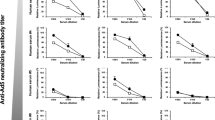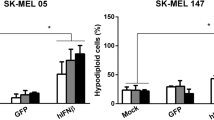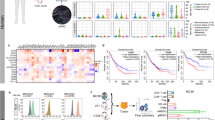Abstract
Recent studies have shown that gene therapy with type I interferon (IFN) in an adenovirus vector is a powerful tool to suppress the growth of human tumors transplanted in immune-deficient mice. However, in these studies the host immune-mediated effects, which may be important in mediating the long-term control of tumor growth by these cytokines, was not studied. In this paper, we evaluate the antitumor efficacy of different adenoviral vectors containing mouse IFN-α genes (i.e., a first-generation replication-defective vector containing IFN-α1 and two different second-generation vectors containing IFN-α2) in immunocompetent DBA/2 mice transplanted with highly metastatic Friend leukemic cells resistant in vitro to type I IFN. We found that injection of all the different adenovirus vectors containing mouse IFN-α genes resulted in a marked antitumor response in mice transplanted either subcutaneously or intravenously with IFN-resistant Friend leukemic cells compared to tumor-bearing animals inoculated with a control vector. Tumor growth inhibition after injection of IFN–adenovirus vectors was associated with a prolonged presence of high IFN levels in the sera of the injected mice. Suppression of metastatic tumor growth was also observed after a single injection of the IFN–adenovirus recombinant vectors, whereas a comparable antitumor response generally required several injections of high doses of IFN. Altogether, these results demonstrate that IFN–adenoviral vectors can efficiently inhibit metastatic tumor growth by host-mediated mechanisms and suggest that adenovirus-mediated IFN-α gene therapy may represent an attractive alternative to the conventional clinical use of this cytokine, which generally requires multiple injections of high IFN doses for a prolonged period of time. Cancer Gene Therapy (2001) 8, 63–72
This is a preview of subscription content, access via your institution
Access options
Subscribe to this journal
Receive 12 print issues and online access
$259.00 per year
only $21.58 per issue
Buy this article
- Purchase on Springer Link
- Instant access to full article PDF
Prices may be subject to local taxes which are calculated during checkout
Similar content being viewed by others
Author information
Authors and Affiliations
Corresponding author
Rights and permissions
About this article
Cite this article
Santodonato, L., Ferrantini, M., Palombo, F. et al. Antitumor activity of recombinant adenoviral vectors expressing murine IFN-α in mice injected with metastatic IFN-resistant tumor cells. Cancer Gene Ther 8, 63–72 (2001). https://doi.org/10.1038/sj.cgt.7700274
Received:
Accepted:
Issue Date:
DOI: https://doi.org/10.1038/sj.cgt.7700274
Keywords
This article is cited by
-
In vivo comparison of local versus systemic delivery of immunostimulating siRNA in HPV‐driven tumours
Immunology & Cell Biology (2014)
-
Growth delay of human bladder cancer cells by Prostate Stem Cell Antigen downregulation is associated with activation of immune signaling pathways
BMC Cancer (2010)
-
Adenovirus delivery provides extended interferon-α exposure and augments treatment of metastatic carcinoma
Cancer Gene Therapy (2006)



